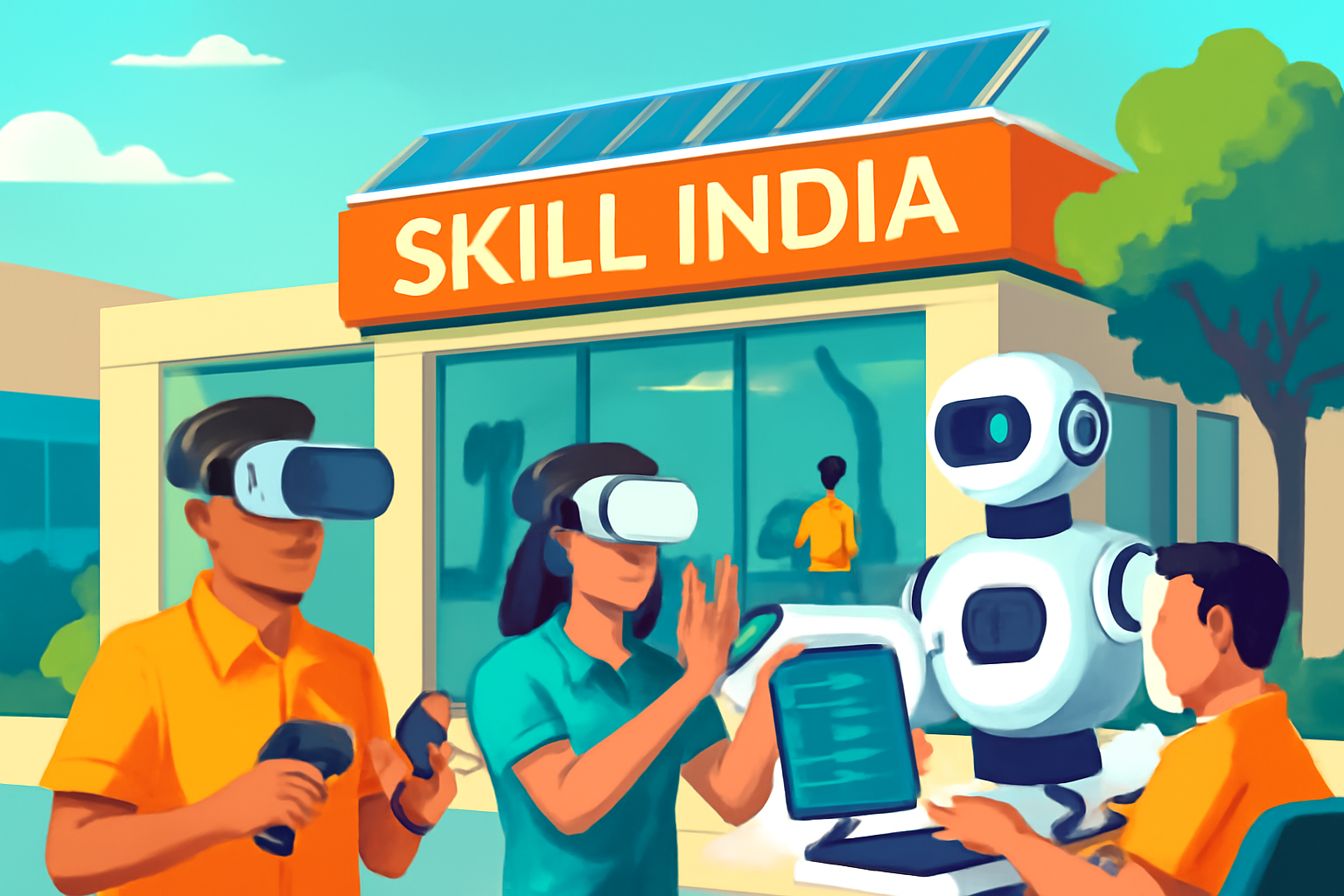
India’s ambitious “Skill India” mission continues to evolve at lightning speed — especially in 2025, where tech innovation and skill development are becoming deeply intertwined. With emerging technologies reshaping industries, it’s crucial to explore how Skill India is adapting to future demands. This blog will guide you through the top trends in tech that are redefining the skill development landscape in India for 2025.
🚀 What is Skill India?
Launched in 2015, Skill India is a government initiative aimed at empowering youth by providing them with skill sets that match industry needs. It includes schemes like the Pradhan Mantri Kaushal Vikas Yojana (PMKVY) and partnerships with tech companies to boost employability and entrepreneurship.
Now in 2025, Skill India is seeing a digital transformation, focusing heavily on next-gen technologies.
💡 Top Technology Trends Driving Skill India in 2025
1. AI and Machine Learning Integration
Skill India has introduced comprehensive modules on Artificial Intelligence (AI) and Machine Learning (ML). Training centers now offer micro-courses on:
- Predictive analytics
- Natural Language Processing (NLP)
- Generative AI tools (like ChatGPT & Midjourney)
With AI projected to add $967 billion to the Indian economy by 2035, acquiring AI-related skills is becoming a national priority.
2. Green and Clean Tech
With India’s goal of achieving net-zero emissions by 2070, clean energy skills are in demand. In 2025, courses in:
- Solar panel installation
- EV battery maintenance
- Green hydrogen production
are part of certified training programs under the Skill India Green Initiative.
3. 5G and Telecom Revolution
With 5G now mainstream across Indian metros, there’s a rising need for network technicians, IoT installers, and smart infrastructure specialists. Skill India’s tech institutes have begun 5G certification programs with hands-on fieldworkand remote learning models.
4. Metaverse and Extended Reality (XR)
AR, VR, and the broader Metaverse have entered vocational training. Skill India is using immersive platforms to teach skills like:
- Welding
- Surgical procedures
- Automobile repair
Virtual reality simulations help trainees gain experience in a risk-free environment, improving retention and real-world readiness.
5. Cybersecurity and Ethical Hacking
As digital inclusion spreads, so do vulnerabilities. Cybersecurity has taken center stage in the Skill India syllabus. Institutes now teach:
- Penetration testing
- Data privacy best practices
- Cloud security
India aims to train over 1 million cybersecurity professionals by 2027, and 2025 is a key milestone in reaching that goal.
🎓 Government & Private Sector Collaborations
Skill India 2025 thrives on PPP (Public-Private Partnerships). Key alliances include:
- Google & NSDC: Launching digital marketing and AI training
- Microsoft & AICTE: Offering cloud and coding bootcamps
- Infosys Springboard: Providing free access to upskilling courses
These collaborations ensure real-world alignment and job market relevance.
🌍 Inclusive Tech for Rural India
One of Skill India’s key missions is bridging the urban-rural tech divide. In 2025:
- Training is delivered through mobile vans, equipped with satellite internet
- Programs are offered in regional languages
- Women-focused skilling centers are expanding across Tier 2 & 3 cities
✨ The Road Ahead: What It Means for You
For learners, this is the time to act. Whether you’re a student, professional, or career switcher, the Skill India platform now offers:
- Free and subsidized tech courses
- Certifications aligned with global standards
- Job placement support in high-growth sectors
📣 Caption (For Sharing)
Skill India is getting a tech facelift in 2025! From AI to Green Tech, here’s what’s shaping the future of India’s skilled workforce. 🚀 #DigitalIndia #SkillIndia2025
#SkillIndia2025 #AIinIndia #GreenTechSkills #DigitalIndia #FutureOfWork #TechEducation #IndianYouth #CybersecurityIndia #MetaverseTraining #5GIndia #VocationalTraining #EdTechIndia #NSDC #SmartSkills #UpskillIndia #carrerbook #anslation #bloghub
⚠️ Disclaimer
Disclaimer: This blog is intended for informational and educational purposes only. The views expressed are personal opinions or general insights, not professional or legal advice. Readers should do their own research or consult relevant professionals before taking action based on this content.


Leave a Reply